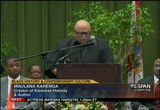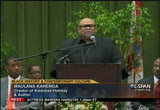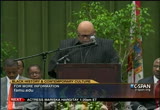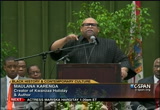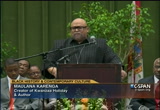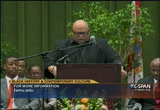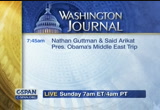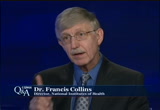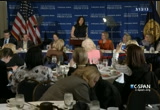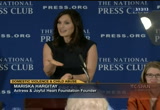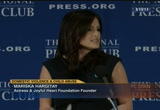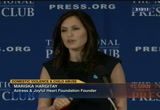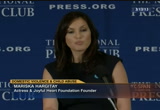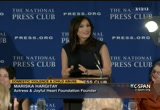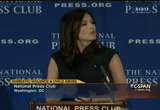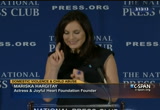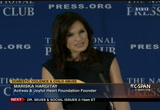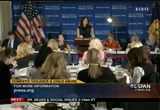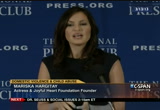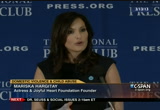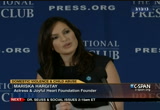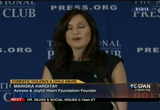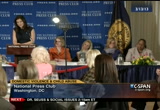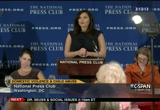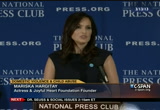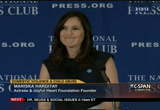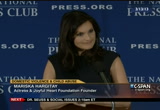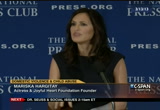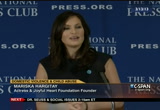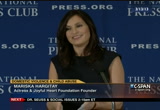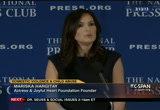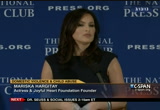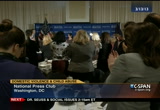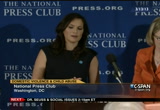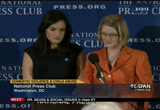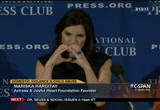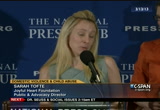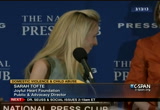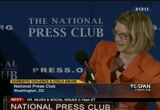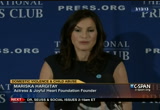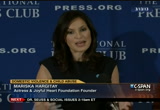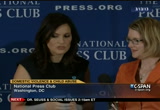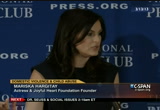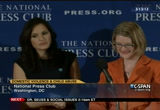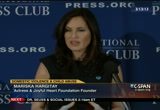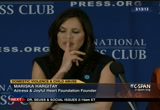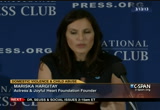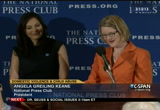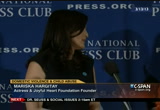tv The National Press Club CSPAN March 24, 2013 1:15am-2:05am EDT
1:15 am
moral and social vanguard in this country. as martin luther king, malcolm x, harry a tuchman, frederick douglass and so many others have taught us, we must avoid the silence in the face of evil and injustice. a silence that would become a betrayer. a betrayer of the best of our ethical social justice and the betrayer of the struggling people of the world. including our own. what is our position on the congo? what about the invasion of africa and libya? what about haiti and its oppression? we must speak truth to power if we really believe in our tradition. if we have a commitment to our own faith. we have to speak truth to power
1:16 am
into the people. we must become not supporters of injustice, but those who challenge it and struggle to end it. indeed, we must not become a convenient moral mass that establishes order. the corporate and political elite used to continue to plunder the world, simply because we have a black president. from the earliest time in the sacred teachings and ancient egypt, we are taught that we are morally obligated to bear witness to truth and to set the scales of justice in their proper place among those who have no voice. many people have no voice. i remember when we had no voice. there we were, locked down and the holocaust. we had to stand up and speak.
1:17 am
others spoke for us, but we had to speak with our own voice. had we speak? -- how do we speak? we don't even talk about the poor. malcolm talked about the poor. martin luther king. we never mention the poor. why do you think that is? everybody got some money? i think not. but we know from our ancient teachings that you measure the moral quality of any society by how we treat its most vulnerable. [applause] so that message of bearing witness, that message of bearing witness to truth.
1:18 am
setting the scales of justice in their proper place, is as valid now as it ever was. still the oppressed want freedom. the wronged in injured want justice. the people want power over their destiny and daily lives. and the world wants peace. what is our duty in light of our awesome history ? what is our duty in light of our world crisis presents we have? the answer is answered by ancestors, which is this -- to know our past and honor it, to engage ever present and improve it and to imagine a whole new future and forge in the most ethical, effective, and extensive ways.
1:19 am
[applause] the conscious of our commitment to such a world and practice of our people, let me end with a paraphrasing of a charge and challenge opposed when i wrote the million man march mission statement. i said, let us always strive and struggle in such a way that we always know and honor ourselves and introduce ourselves to history and humanity as a people who seek and speak truth. who do and demand toughness. who honor our ancestors and elders and cherish and challenge our children, care for the poor and vulnerable, and gave them in their struggle to and their poverty and empower themselves. maintain a relationship and constantly struggle against evil and injustice and always raise and pursue and practice the good.
1:20 am
if not this, then what? if we don't do it, who will ? thank you very much. [applause] [captions copyright national cable satellite corp. 2013] [captioning performed by national captioning institute] >> next actress mariska hargitay on victims of child and sex abuse. and socialuss issues. than a senate hearing on the airline merger for us airways >> tomorrow on "washington journal" a discussion on president obama's trip to the middle east with nathan guttman and said arikat. the plante will discuss
1:21 am
importance of presidential press conferences. and they guessed from the brookings institute. -- and a guest from the brookings institute. "washington journal" live at 7 a.m. eastern on c-span. >> you can take pictures of the brain with m ir scans and see the whole thing. there is this enormous gap in between on how the circuits in the brain functions in order to move my hands were looking you in process that information or to lay down a memory. we do not know how it works. a lot of this will be technologies that will be devout. a lot of this will be nano technologies. we need to be able to record thousands of brain cells at the same time and understand how the circuits work. that is a brain at to the map that is being talked about. we do not really have a map for
1:22 am
, but it is is an exciting moment to put something together. nih directorthe dr. francis collins sunday night on c-span's "q&a." >> now actress mariska hargitay talks about efforts to help survivors of sexual assault, domestic violence, and child abuse. svu."tar of "law and order: this is under an hour. >> i am so honored and thrilled to be here today. thank you, angela.
1:23 am
reminding me of the old days. [laughter] my heart is beating, and it is such an honor, thrilled to be here for so many reasons. i just came from standing with the vice president and attorney general holder at a press conference to highlight the dire and immediate need to reduce domestic violence homicides. and now here i am with all of you in washington dc, a very exciting day. the kind of day that makes your diary burst into flames when you write about it. i have to tell you that i whipped out my cell phone and took a selfie with the vp. [laughter] you understand that i own the honor of being here today to a very sweet woman. where are you? hiding. there you are. i wanted to point that out to everybody, family's daughter. i want to thank you for throwing my name into the ring.
1:24 am
i also understand that you want to be a prosecutor when you grow up . i thank you in advance for everything you're going to do with your life. the website for the national press club describes this as a place where news breaks out and flows out into the world. where journalists trained to become the next generation of storytellers. all that serves to reinforce not only what a huge and and great honor this is to be here, but also the scope of this opportunity and the importance of this moment and this day. also says on the website that the stakes and be higher. i cannot agree more. when i i was thinking about what i wanted to say here today, and this place where news flows out into the world, i thought about my first encounter with the statistics of sexual assault and domestic violence and child
1:25 am
abuse. it was almost 15 years ago, i hate to say. i was doing research for my role on "svu" and there they were. if you'll bear with me, i would like to repeat them, even though angela has already sent them. i think there were three feeding -- they are worth repeating and repeating and repeating. in this country, one in three women experience physical or sexual abuse by an intimate partner in her lifetime. one in four girls and one in six boys are sexually abused by the age of 18. every two minutes in the united states, somebody sexually assaulted. every nine seconds, a woman is beaten. every day, more than three women are killed by an intimate partner. and everyday, five children die of abuse and neglect. the statistics went on, and then the letters came. at first there were a few, then there were more, than there were hundreds, and since then there have been thousands, sadly.
1:26 am
women and men writing these letters to me did not ask for an an autograph, a headshot, they just goes your stories of abuse -- they just disclosed their stories of abuse to me. majority of them had some version of the phrase, i have never told this to anyone. there i was, holding in my hands, the stories behind the statistics that i had just learned. there i was at work every day, having these issues pressed into my soul. pressed into my consciousness. they were imprinted on it. they changed my thinking. so i educated myself, i trained to become a rape crisis advocate and joined a few boards, i got involved. i am so proud to be on a show that was brave enough to go into a territory that nobody else is talking about. obviously, i had my role to play on television, but after learning what i learned in hearing the statistics in receiving these letters, i knew that i wanted to do more.
1:27 am
i wanted to play a larger role in helping survivors heal and reclaim their lives. in 2004, i started the joyful heart foundation. our mission is to heal, and power and educate survivors of the mystic, sexual assault, and child abuse. and shed light on the darkness that surrounds these issues. i get emotional. because of our ceo, we have raised more than $10 million -- [applause] thank you. let me try that again. we have raised over $10 million in private funds and served directly over 10,000 survivors and the professionals who care for them.
1:28 am
we have connected with over one million individuals through our education and awareness initiatives and have championed crucial legislation and policy reform, which i am very proud of. to get justice for survivors. while i am not an expert on these issues, i proudly claim the title of advocate. in the literal sense of the word. one who calls out to you. that is my inner self clapping for myself, did you hear that? [laughter] ok. one who calls out for you on behalf of the thousands of survivors whose voices, courage, hope, that i am honored to bring into this room with me today. today i want to talk about gardening. how was that for a left turn?
1:29 am
[laughter] when you buy a plant, it comes with instructions. it says, requires watering daily. thrives in sunlight. if the issues of domestic violence am a sexual assault, and child abuse can with a label on them to how to make them grow in society, it would say, requires darkness, thrives in darkness. silence, fear, shame, and isolation. silence allows criminals to thrive. think about how helpful it is for each one of us -- how helpful it is to a criminal, if we are not willing to talk about these crimes. and this is not about the
1:30 am
victims who refused to come forward. i'm talking about everybody else. all of us here in this room. think about how helpful it is for a rapist if we consider rape and unseemly topic, one that is too frightening, that is too complex, one that is too murky, too difficult to prosecute, or simply not worth it. what kind of society do we end up with? we end up with a society where, after 40 years plus, you can still count on one hand a number of corporations funding these issues in any significant way. many of you are here today, and i want to say thank you for that. we end up with a society where schools and institutions settle cases of sexual violence with as little transparency, as little accountability, and as little exposure as possible. a society where it is so hard for the antiviolence movement come together because, in order
1:31 am
to compete for limited funding, organizations must stand out. by definition, it must stand alone. we end up with a society where, although, thank god, congress recently reauthorize the violence against women act, thank god -- [applause] what we end up with a society where, 22 senators and 138 congressman voted against it. it is unconscionable. it's unconscionable. we end up in a society where, after a victim has been raped or beaten at the hand of a spouse, after the devastation of the,, -- of the trauma, she has to live through the trauma of how society receives her. she has to survive the trauma of, we don't want to deal with that.
1:32 am
we don't want to talk about that. she has to live through the trauma of, what was she wearing? why was she dancing like that? why was she out so late? what did she expect? she was asking for it. i'm sure he didn't mean it. he is such a nice guy. why didn't she just leave? to me, one of the most shocking demonstrations of how we regard crime in our society is the backlog of untested sexual assault evidence kits. rape kits. which are sitting in police storage facilities across the country. both because i feel compelled to talk about it every chance i get, and because it is such a clear and concrete example, please allow me to dig down into this issue for a second.
1:33 am
everyday in the united states, individuals take these enormously courageous steps of reporting their rape to the police. because of what they have suffered, their bodies are a living, breathing crime scene from which doctors and nurses collect a rape kit. this process of evidence collection takes between 4-6 hours. if somebody endures a 4-6 hour invasive exam, that evidence would be tested. it can affirm the survivor's attack of the story. discredit the attacker. connect the suspect to other crimes. say that one again -- connect the suspect to other crimes. i should say the third time,
1:34 am
really. you have got to get this one. they can also exonerate innocent. the bottom line here, a rape kit can bring justice. often an integral part of a survivor. it is vital in keeping rapist off the street. yes, federal authorities estimate that there are hundreds of thousands of untested rape kits across the country. hundreds of thousands. i don't get it. polly hoskins is a leading sexual violence advocate perfectly summed it up when she said, if you have stacks of physical evidence of a crime and you are not doing everything you can with this evidence, then you must be making a decision that this isn't a very serious crime.
1:35 am
here is the good news. jurisdictions have started to see the results of testing every single rape kit. new york city cleared its backlog of 70,000 kits and now tests every single kit that comes in. the proof of the value of testing every kit -- their arrest rate for rape jumped from 40% to 70% compared -- [applause] right? huge! compared with only 24% nationally. fight with statistics. within the past two years, los angeles have also cleared its backlog of 12,669 kits. and then there's detroit. and the unbelievable wayne county prosecutor, ms. kim worthy -- [applause] who is here with me on the dais. i really want to be you when i grow up.
1:36 am
it takes us seven days to shoot an episode. her office -- and she did not handles 70,000 cases a year. and she did not have a full-time unit to prosecute crimes until just under two years ago. now, only has six assistant prosecutors, three investigators and one victim advocate. for 70,000 cases a year. she is a mother of two, just saying. [laughter] in 2009, her office discovered that there are more than 11,000 rape kits rotting, literally, in a storage room in the detroit police department. the national institute of justice, lynn rosenthal and chris rose, who are also with me today on the dais, addressed the backlog.
1:37 am
thank god. the joyful heart are so proud to partner with them on this work. just weeks ago, when the first 400 kids were tested and entered into the national dna database, law enforcement were able to identify 29 serial rapists. [applause] it is huge. that is only out of the first 400. we are talking about hundreds of thousands. that just goes to show you and makes you think about what could have not been. one of the kids in detroit belonged to a young mother who was raped at gunpoint in her bed while her two young children were sleeping next to her. immediately following the
1:38 am
attack, she bravely called the police and went to the hospital, where evidence was collected from her body. in her words, said, i have no choice, the only way that i had of getting the person on the street was to go. the rape kit was tested, 14 years later. 14 years. when a prosecutor finally told her that they had identified a rapist, she courageously moved forward with the prosecution. her attacker was found guilty and sentenced up to 60 years in prison. that is the happy ending of that story. detroit has nearly 10,000 untested rape kits remaining. the city's financial woes are making national headlines. joyful heart is also working with kim's office to explore how to raise the 12-$15 million it would need to finish the backlog. the detroit commission is also set up a fund to which individuals from all over the
1:39 am
country have already given $40,000, many intonations of $10 and $20 increments. from survivors in detroit i want to help, people who just want justice, people want their rapists off the street. people who want to send a message that rapist will be accountable for their crimes. where does that leave us? does it leave us defeated? no. it leaves us with where we are today. as a society. today, as a society, we say, no more. everyone say it with me. no more. >> no more. >> for the first time, nearly
1:40 am
every organization that is working to change the haunting statistics behind these preventable crimes, whether the organization focus is on women and girls, men and boys, teens, children, rural or urban communities, it is coming together in a movement, united under one symbol. no more. peace has its peace sign, and the red ribbon demands action for aids, and a pink ribbon has changed the way we think about breast cancer. and now, our collective commitment is to end sexual assault and domestic violence. it now has its own symbol, it's sign, it's beacon. it is not an initiative, it is not a campaign, it is a call to action. it is a movement to stand up and began out for every woman, man, every child who is suffering from this violence.
1:41 am
in a movement for every victim struggling to find their voice perpetrators have relied on the fact that the movement to stop them would not come together. they have relied on the fragmentation, they depend on fear and silence, to keep doing what they are doing. no more seeks to remove the shame and stigma around surviving these issues. to make these issues easier for people to talk about what we're doing here today. and to empower bystanders in every community to get involved in preventing them. you think, what am i going to do? how am i going to get involved? that is what this is. it is for everybody to get involved. no more leaving it for others to find the answers. no more blaming survivors. no more standing by and doing nothing. no more has been years in the making. what began as an idea three
1:42 am
years ago, today has become a reality. people align themselves with this movement and the cause gains visibility. policymakers will take notice. leading to stronger public policies and more funding for prevention of services. this means more funding for places like wayne county and kim worthy who need it. more funding for survivors to have their rape kits tested. together, we can end domestic violence and sexual assault. together. today, you have the opportunity to play a role. it is simple, really. each of you has been given a pin displaying the no more symbol, i am asking you to wear it. simple as that, wear it. i am asking you to share it. at least some of you in this room?
1:43 am
-- who question whether this will work. understandably. the closest corollary i can give you is the aids ribbon. aids was an issue that nobody wanted to talk about. it concerns sexual behavior and drug abuse, and people blamed there was a lot of stigma around it. when people started wearing the aids ribbon, it moves the issue into the open. it urged people, it encouraged the conversation, discussion, and ultimately contributed to a better place for policies, progress and for combating the illness. making aids-related discrimination less acceptable. that is our wish for no more. it begins here today in this room. in this room here, today. it is a moment. a big one. so -- anyway, we all have a role to play in this.
1:44 am
i deeply encourage you to play yours. to end domestic violence and sexual assault. it may not happen in my lifetime, but i am committed to doing my part in bringing that about. conversations like this are happening all over the city today in capitol hill, on twitter, and speaking of playing a role -- the wizards are playing the milwaukee bucks in a game dedicated to no more tonight. this what a day looks like when these issues are pressed, the way they ought to be pressed. ideas that were deliberately. i believe that is our job. yours and mine, to press areas we must press things out into the light. we must press our fingers on the button of the bullhorn to make the world listen. as members of the national press club, i urge you, leaves, to press on and teach the next
1:45 am
generation to do the same. i just want to say that when i started out on this journey, i was an actress, and very happy that i had landed a gig on a tv show. [laughter] truly. i did not know that i would start a foundation. i didn't know that joyful heart would have a place in the first- ever white house roundtable on sexual violence. i did not know that i would testify before congress. i did not know that i would ever get to me the president and stand with joe biden, my hero, who wrote the original legislation. i did not know that i would have the privilege of seeing survivors take the courageous steps toward healing and reclaiming their lives. in short, i did not know i would be here today. as i watch my diary burst into flames tonight, i will celebrate
1:46 am
1:47 am
we have a lot of questions on several different topics. catch your breath. get a drink of water, and come on back up. [laughter] there are no questions about makeup. >> darn it. >> first question -- there are many causes out there. lots of good ones. why the "no more" movement? >> i think that we are stronger in numbers. we are more powerful in numbers. education, illumination,
1:48 am
learning about how -- through my job, what i have learned and how these issues have pressed into me, as i started the joyful heart foundation, i seen so many different organizations vying for the same things. i think that dilutes. it is about unity and coming together. i have seen the way coming together and rallying around a cause and a survivor makes change. when a group of like-minded people come together, a change is made. >> where did you learn about the rape kit backlog? who talk a lot about what it is, why it matters, how did you learn about that initially and why did you pick that is one thing to focus on? and follow-up on that -- where besides detroit is progress still needed to be made on that front?
1:49 am
>> the first part, where a lender about the rape kit backlog was miley, the ceo joyful heart had just come back from meeting with sarah, the expert on it. when i learned about -- one assumes that if somebody gets the evidence that can seek justice, you assume -- and i was so horrified and mortified. truly, in disbelief. pained for everyone knowing that justice was not being served in this way. i thought, as i said, it is a perfect microcosm of how these issues are regarded. kim and sarah -- kim and sarah can speak about where the other places are like detroit, if i may invite you up to answer
1:50 am
that. >> thank you. that is a great question. where else -- what other cities are struggling with untested rape kits on the backlog? the big answer is, we are not sure. we only have estimates that the moment. but she said earlier, hundreds of thousands of untested kits. perhaps in police storage facilities across the country. the fact is, very few, only two states actually track what happens to rape kits. once they are collected from victims. that would be the state of illinois and the state of texas. very few other cities. we are not sure. one of our big reform pushes is to get the federal government and other states to require that police report out publicly what they are actually doing with rape kits. in our experience, once a city
1:51 am
announces a rape kit backlog, we can find the resources and political will and public outrage to make the changes that are needed. i can say that every city we have ever looks at, anyone we have ever asked for numbers, has ended up with backlogs at a minimum of 1000 or so, but usually in the multiple thousands. 10,000 or so. lots of cities are struggling with this. those that haven't knowledged it, like los angeles or new york or cleveland or detroit or houston, dallas, those are cities that have publicly acknowledged backlogs and are actively taking steps to fix it. it is just too embarrassing not to. >> i am kim worthy, the wayne county prosecutor. you assume that cities report when they do them. there was a study done five
1:52 am
years ago when i found untested backlog rape kits in 49 out of the 50 states. the biggest problem is getting people to a knowledge problem. people try to sweep it under the rug once they found them. >> our next question is for the subject matter experts, as well. feel free to throw it back. what does it cost to test a single rape kit and what exactly is involved in the testing? is that dna testing or more to it than that? >> i would love chris to answer that. in terms of what it actually means to test a kits. the general cost is roughly -- you hear lots of different estimates between $1000 and $1500. that is a general estimate. it is expensive. but we have also -- our experience is that it is not just about the resources. once the community commits to
1:53 am
and prioritizes testing, they find a way to find the money. >> i am chris rose, deputy director at the national institute of justice, the research arm at the u.s. department of justice. sarah is right, the testing of a rape kit, dna testing can cost anywhere between $1000 and $1500, i would say. we at the national institute of justice, i will give us a little bit of a plug, are working towards faster and cheaper ways of doing that. once you can get that kind of thing in place, along with a number of other things, because this is a multifaceted problem, then we can really make some progress and move things along quicker. >> thank you. turning now to the show. questioner says, your tv character influenced your thinking and your advocacy. how much do you influence your character and the content of your show? [laughter]
1:54 am
>> i like the question. [applause] [laughter] i would say it is 50-50. i used to talk about olivia benson, i would say, i have learned so much from her. she is -- excuse me for reaching. she has -- it can still be polite. that is sort of her motto, fearlessness. it is not that she doesn't have to fear, it is that she does it anyway. it is not about her, she is a mama bear. a lioness. what has been so exciting about this process and about me needing to do something from my outrage, and if i could just say, sarah and tim, for me, i was a civilian. i learned about the rape kit backlog and was like -- what? i cannot believe it.
1:55 am
everybody i have told that has responded the same way. we assume -- you just assume you get a rape kit done that it gets tested. when you learn about all the things and why they don't, it is a call to action. it pushes you into action. in terms of olivia, at first i wanted to do something. she influenced me. and now, with my stellar a-team behind me at joyful heart, they have helped increase the show. now, our show runner, warren, is such an incredibly great man and understands the value and the platform of the knowledge that we have access to. because of that, we have done shows about it. there will be times when i will read a script and say, this is an opportunity or, let me have
1:56 am
our expert on that. or, kim, can healthy with these statistics? did a show on the rape kit backlog. we have done so much about a survivor and what happened and the process and the answer to your estimate of what -- what does the rape kit entail? we showed it, because people just do not know. there have been many places where now joyful heart is aiding the show and supporting the show. our original executive producer was also a board member. i think people with a soul that are bright to please men, understanding platform may have and the power in educating. i hope that answers your question. >> yes. given your advocacy and your position with the important topic, how did you respond to having mike tyson guest star on the show ? what was it like to have him on
1:57 am
the set with you? >> ultimately, i think that the episode was a very powerful episode. my response was, i did not know that they had cast mike tyson originally. initially. where my concern lie was how survivors would respond. my concern was -- i understood their confusion and why they would be hurt and confused by this choice. that is what i wanted to take care of, survivors who often, in the past, have not had a voice. i wanted to make sure that they had one. that is why we stood about joyful heart and made the statement that we did. again, life is complex. i don't know all the cases of all the moving parts, but i thought the episode was compelling and powerful and the
1:58 am
end of the day, it told a beautiful story. >> are there any other shows in hollywood that you think you're doing a good job shining light on this subject that her onto -- that are also on tv now? >> that is a great question. i have 14 children. i don't really watch tv. that is the truth. [laughter] i am trying to think there are any shows. nothing comes to mind right now. that's -- if i think of something, i will let you know. [laughter] i just don't watch television. >> tv often lacks the nuance in detail of real life. what do you think is the most unrealistic part of paper trail
1:59 am
of sexual assault or domestic violence on "svu" either of what you show or do not show? >> what is the most unrealistic part? sarah? ok. yeah, i will say it. um -- i think that olivia benson and the members of the special victims unit on "svu" are extremely compassionate and well-versed in these issues and knowledgeable and empathetic. and, maybe sometimes, not every survivor or victim is met with the compassion and respect that they should be met with.
2:00 am
2:01 am
think how can i do research to play this character with the integrity i want? , and modelingrch myself after a few detectives i ,et and i thought were amazing the or powerhouses and doing their jobs and would never stop at anything. i wanted to be like them. the night when they learned these statistics, my boss was .eing honored by organization had a dinner and that was the night i learned in these statistics. and then i learned about rape counselorse crisis and advocates.
2:02 am
i went to that training to become that and learning what i learned there and how to deal, respectfully and kindly, with survivors, the way the district -- they deserve to be, really infused my character. i wish that all cops, all detectives, all special victims unit detectives, -- or all cops, really, the could understand the compassion that -- i said one time, how would you feel if your bike got stolen? your house was robbed? in the top just you and w and did not treat you with respect. it is about respect. that is an important part. >> violence in the media has been in the news a lot. in recent months and, obviously "svu" is, i'm assuming, not a program you watch with your children. anddo you do activism trying to curb violence in real life with the fact that the show is a violent show on television? >> i think that when material dealt with responsibly and
2:03 am
when consequences and accountability are shown, -- gratuitous ands out there, and people imitate it when there are no consequences. and things get you into a crazy fervor, i think that "svu" brings to light issues that have not been talked about. you see people having to take accountability. itt is the part that puts through a different lens. you are having people talk about issues that they normally don't talk about, and then showing perpetrators the consequences.
2:04 am
the beauty of joyful heart in that way is that, with olivia benson and the entertainment component, combined with what we are all doing in this room and the power of this unity, it is going to change everything. if we say to perpetrators, i will not stand by and watch what you do. i will not not tell. i am involved. i see you. i am watching you. now i am going to take accountability. it is our problem. there is no more, who am i to get involved? who are you to get involved? you are a human being that is watching violence, witnessing somebody being hurt. it is about accountability. it is about connecting to our responsibility as a human being. [applause]
157 Views
IN COLLECTIONS
CSPAN Television Archive
Television Archive  Television Archive News Search Service
Television Archive News Search Service 
Uploaded by TV Archive on

 Live Music Archive
Live Music Archive Librivox Free Audio
Librivox Free Audio Metropolitan Museum
Metropolitan Museum Cleveland Museum of Art
Cleveland Museum of Art Internet Arcade
Internet Arcade Console Living Room
Console Living Room Books to Borrow
Books to Borrow Open Library
Open Library TV News
TV News Understanding 9/11
Understanding 9/11